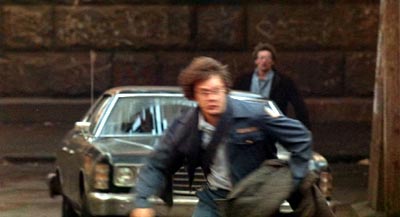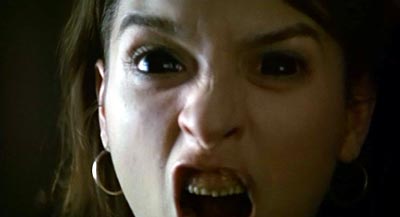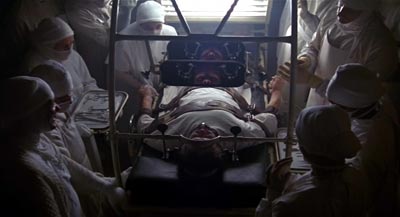Jacob's Ladder
Reality and insanity collide for a Vietnam vet who sees demons in his sleep.

Having given us the metaphorically vaginal image of Mickey Rourke and Kim Basinger shagging in a dripping wet alley archway, Michael Douglas and Glenn Close shagging in a metaphorically penile lift shaft and then the subsequent boiling of a certain bunny, director Adrian Lyne must have been worried about a bit of directorial typecasting. What better change in direction to take from thinly-veiled Hollywood porn than a nice, gentle Vietnam movie with a difference? That should alleviate all the depression of his previous two films, eh?
Jacob's Ladder is not an easy pill to swallow. It's quite a difficult watch but like so many movies of it's kind ultimately rewarding if you invest enough time. Jacob Singer (Tim Robbins) is, or appears to be, a Vietnam veteran living in New York with his second wife Jezzie (Elizabeth Pe?a) who is suffering an increasingly odd bout of hallucinations. I say "appears to be" because as the movie progresses it becomes increasingly difficult to assess which scenarios, if any, constitute Jacob's "real" world. Confused? You don't know the half of it.
Beginning in Vietnam, Jacob is sitting with his comrades in camp awaiting combat orders when several members of the squad take violent fits. At the same instant all hell breaks loose with a cry of " at the movement treeline!", and the team find themselves engaged in bloody combat. Hiding in the trees, Jacob is given a particularly nasty bayonet to the guts by an unseen aggressor whom he appears decidedly reluctant to retaliate against before falling to the ground in severe need of some Pepto Bismol.
At this point we cut to Jacob sleeping in a subway train carriage, coming to and realising he was having a flashback. He now works for the postal service and is on his way home, but appears to have missed his stop so he hops off at a deserted station and realises he's on the wrong platform to exit onto the street. Crossing the lines to reach the other side, an oncoming tube train forces him to dive out of the way, and looking up at the passing carriages he sees strange faceless figures staring as they flash by. It's the first of several such disturbing images Jacob will henceforth experience in what we assume is his actual life, although your guess is as good as mine on this.

As the movie progresses the narrative slowly degenerates, becoming increasingly more fractured and mirroring Jacob's apparent mental degeneration. At times Jacob is married to Lizzie, at others he wakes up in bed with his first wife and refers to dreams in which "Lizzie from the post office" features heavily. Sometimes he is in hospital, at others a psychiatric ward, and at one point he is visited by his dead son (played by a young and uncredited Macaulay Culkin). Cutting at various intervals to sections from that fateful evening in Da Nang, we slowly learn more about Jacob's fate in the humid jungle and it ultimately transpires his unit may have been exposed to a new hallucinogenic government drug called "The Ladder" designed to unleash the soldier's primal instincts and make them more efficient fighting machines.
Given the number of stories and documented cases of soldiers in 'Nam being experimented on with LSD amongst other things, Jacob's Ladder seems all the more disturbing in that the central premise may well be rooted in some reality. Essentially though, the film presents itself as a metaphor for purgatory, a fact later uncovered by Jacob's chiropractor Louis (Danny Aiello) who he frequently refers to as an angel. Louis explains that the demons Jacob sees are only demons because he refuses to let go of his life. Accepting his fate will reveal them to be angels cleansing his soul of emotion that he no longer needs to enter the kingdom of heaven. Indeed, the film's denouement sees Jacob lying dead on a stretcher in Vietnam whilst in his delusion he ascends the staircase of his home with his dead son, enveloped in a bright white light.
It seems that in the end the whole film may be the soul-cleansing stint in hell of a man on the brink of death, forced to reconcile himself with his past. It seems likely this is the case, given the numerous biblical references and allusions to the likes of Dante's Inferno, but for many the debate still rages and there is certainly enough suitably ambiguous material here to support arguments to the contrary. To split hairs over such trivialities is missing the point however, as Jacob's Ladder represents more than just a nightmarish vision of one man's hell on Earth.

Robbins is on top form throughout as a man on the edge of sanity, madness and pure nightmarish hell. Nobody quite does a thousand yard stare like our Tim, and he is both brilliant and disturbingly believable in such a difficult role. Likewise Elizabeth Pe?a provides excellent support as a suffering partner (assuming she's real) forced to cope with the gradual mental degeneration of the man she loves. Aiello is seldom on screen but his usual excellent self when he's around, and able support from Jacob's similarly delusion-suffering 'Nam buddies played by a pre-ER Eriq La Salle and the then largely unknown Ving Rhames. Pruitt Taylor Vince, who we last saw in Identity puts his shaky eyes to good use as the deranged Paul, another of Jacob's buddies from that hellish night who is killed when his car explodes in an act possibly perpetrated by the military to keep him quiet.
Fortunately Lyne's direction is well up to matching the performances of his stars. Despite the difficult themes and ultra-disorienting narrative, Lyne keeps the audience engrossed with a succession of increasingly disturbing images that draw the viewer into Jacob's hellish puzzle, creating genuine empathy with the protagonist. You may well not understand what the hell has transpired by the time the credits roll, but if you enjoy thought provoking stories that don't hand you explanations on a platter then Jacob's Ladder has a huge amount to offer.
By turns intriguing and utterly inexplicable, Jacob's Ladder is a film that undoubtedly rewards repeat viewings and will reward the observer on new levels each time they do. Difficult to follow, hard to comprehend, this is nonetheless engrossing for anyone prepared to invest a little effort, aided mostly by absorbing performances and assured direction. Disturbing, thoughtful and most of all unique. Highly recommended.
Craig Disko has awarded this film 4 out of 5 Disko Inferno Points.
Elizabeth Pe?a (Jezzie)
Danny Aiello (Louis)